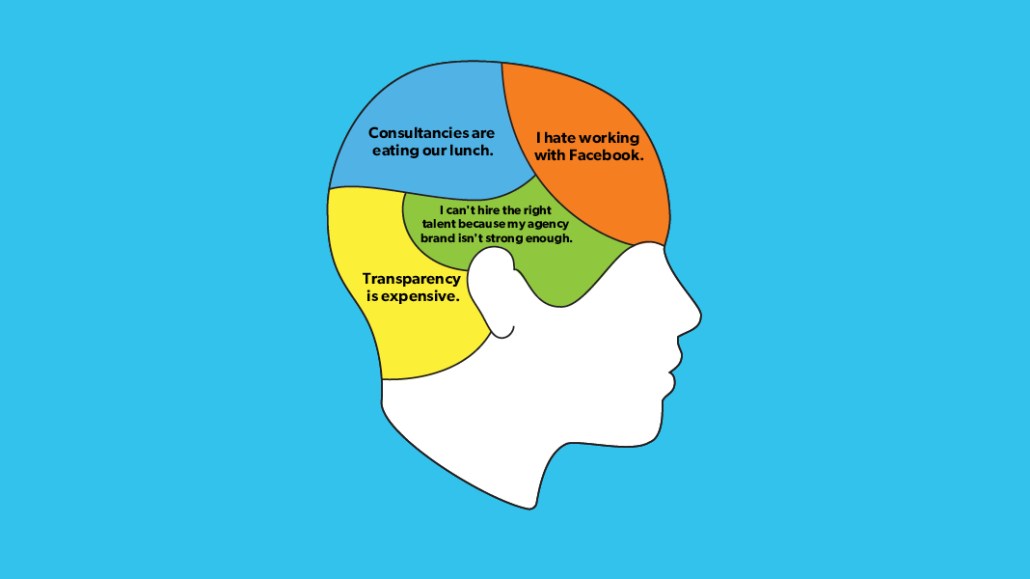Secure your place at the Digiday Media Buying Summit in Nashville, March 2-4
‘We’re giving the business away to consultants’: Agencies brace for new competition

Agencies of all shapes and sizes gathered in Charleston, South Carolina, this week to discuss what’s ailing the agency world and how to build the next great modern agency. Over town halls and working group sessions, they discussed everything from consultancies to transparency. Here are the highlights.
Consultancies are coming
“The issue is that consultancies can layer everything on each other. They say, ‘We’ll activate media for free.’ And my red flag goes up. We’ve been more than commoditized.”
“We don’t go even go head-to-head with consultancies in pitches. They just add in the agency services for free.”
“I have a friend who works at Deloitte — the consultancy, not the agency arm. He’s much more intelligent than me. But in my encounters with digital arms of consultancies, he’s not who we’re dealing with. We’re dealing with agency personnel who’ve gone over there. If, over time, if clients realize that consultancies and agencies are the same because they’re staffed by the same people with similar ideas, we’ll be OK. What worries me is the narrative of, ‘Hold on, this guy is from Accenture; it has to be brilliant.’”
“I think consultancies are allowed more to look at the business side of things than agencies. Clients are not willing to share confidential information with us.”
“When we start going beyond our scope, say, if it’s lead gen, and we talk about other things or capabilities the client should be working on, clients act like we’ve crossed a line. But if consultancies did it, no eyelashes would blink. It’s not about being accusatory. We try to partner with a client. But we can’t adjust our capabilities if we’re not allowed to.”
“It’s easy to get hung up on the term ‘agency.’ It’s about asking the right questions. We don’t ask the right questions, which is why we’re giving the business away to consultants.”
Transparency
“How did we get here? Let’s be real. We made poor decisions.”
“Transparency issues are everywhere. Transparency with cost, media spend or how you operate with vendors. There are transparency issues between agencies and vendors about fraudulent or non-viewable impressions. So there’s already a layer of mistrust, and you’re adding to it. There are a lot of places transparency can fall apart.”
“Certain verticals have varying degrees of transparency. Clients dictate the level of transparency they want. I have clients who don’t pay attention to CPMs; they pay attention to the environment because it’s more tangible to them. It’s like opening a newspaper and seeing your ads or driving down a highway and seeing billboards. That’s tangible.”
“They want us to navigate issues for them. But they need to understand that processes and resources spin out of it. We can all be as transparent as you need to be, but it adds hours. I can spend all day in DoubleVerify. But it’s probably not where some of our time is best spent. There are trade-offs that come from process transparency.”
“Tech fees are skyrocketing wherever you are, media agency, or vendor or client. It’s another toll in the highway stripped away from working media.”
“Are we just one multimillion-dollar fraud story in the headlines away from our clients running to the hills?”
Platforms
“My least favorite platform is Facebook. Facebook has been painful to work with, not just from a customer service perspective. It’s just hard to do advertising planning against Facebook.”
“Facebook doesn’t have the capacity to service you while there are so many nuances in marketing on the platform. You won’t know those nuances until you launch an ad campaign, and then you look awful in front of clients.”
“Google is just as bad as Facebook. Google is now just trying to compete with Amazon and use its client assets to drive more [ad] sales. Google is trying to use our data to better itself, instead of taking care of clients’ needs.”
“Marketing automation platforms are all terrible. They are overkilling things that could do efficient marketing.”
Contributing: Yuyu Chen
More in Marketing

Future of Marketing Briefing: AI’s branding problem is why marketers keep it off the label
The reputational downside is clearer than the branding upside, which makes discretion the safer strategy.

While holdcos build ‘death stars of content,’ indie creative agencies take alternative routes
Indie agencies and the holding company sector were once bound together. The Super Bowl and WPP’s latest remodeling plans show they’re heading in different directions.

How Boll & Branch leverages AI for operational and creative tasks
Boll & Branch first and foremost uses AI to manage workflows across teams.








